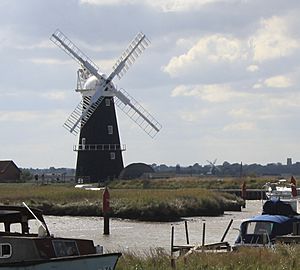Berney Arms Windmill facts for kids
Quick facts for kids Berney Arms Windmill |
|
|---|---|
 |
|
| Origin | |
| Mill location | Reedham, Broadland, Norfolk, England |
| Coordinates | 52°35′12″N 1°38′16″E / 52.58657°N 1.63788°E |
| Operator(s) | Managed by English Heritage |
| Year built | 1865 |
Berney Arms Windmill is a very tall and old windmill. It stands in a quiet spot next to the River Yare in Norfolk, England. This area is part of The Broads, a beautiful network of rivers and lakes.
The windmill is quite isolated. You can't reach it by car! Instead, people arrive by boat, by walking, or by train to the nearby Berney Arms railway station. This special windmill is looked after by English Heritage. It is known as a Scheduled Ancient Monument, which means it's a very important historic site.
Contents
About Berney Arms Windmill
This windmill is super tall! It stands about 21.5 meters (70 feet) high. That makes it the tallest windmill in Norfolk that was used for drainage.
What it looks like
The windmill is built from red bricks. Its outside walls are covered with a black, sticky tar. This tar helps protect the bricks from the weather. The mill tower has seven floors inside.
The top part of the windmill, called the cap, looks like an upside-down boat. This is a common style for windmills in Norfolk. The mill has four big sails that catch the wind. It also has a fantail, which is a small set of blades at the back. The fantail helps turn the cap so the main sails always face the wind.
How it worked
A special part of the mill is its scoop wheel. This huge wheel is not right next to the mill, which is a bit unusual. It's connected to the mill by a long, flat shaft. The scoop wheel is about 7.3 meters (24 feet) wide. It has long wooden paddles.
These paddles would scoop water from the low-lying marshland. Then, they would lift the water into a narrow brick channel. This channel would release the water into the River Yare, which is at a higher level. This process helped drain the surrounding marshy land.
History of the Windmill
Berney Arms Windmill was built in 1865. It was made by a company called Stolworthy. They built it on the same spot where an older mill used to be.
Making cement
When it was first built, this windmill didn't drain water. It was used to grind cement clinker. This clinker was a hard material used to make cement. The raw materials for cement came from nearby areas. Chalk came from Whitlingham, and clay was dug from Oulton Broad or Breydon Water.
These materials were brought to the mill by special boats called wherries. They were then heated in big ovens called kilns. The kilns made the clinker, which the windmill then ground into a fine powder. At that time, there was a small village around the cement works, with houses and even a chapel.
Becoming a drainage mill
The cement factory closed in 1880. A few years later, in 1883, the windmill got a new job. It was changed into a drainage mill. Its new purpose was to drain the water from the nearby marshland. This helped make the land useful for farming.
The windmill worked hard until 1948. Then, modern motor pumps took over its job.
The Windmill Today
After it stopped working, the windmill was given to the government in 1951. Restoration work began in 1967 to fix it up.
Recent restoration
The windmill needed a lot of work over the years. A big restoration project started in 1999. First, the sails, cap, and fantail were taken off. It was a long time before they were put back. The cap was replaced in 2003. The fantail went back on in April 2006. Finally, the big sails were put back on in May 2007.
Visiting the windmill
Today, Berney Arms Windmill is still looked after by English Heritage. It is usually open for pre-booked group tours. Sometimes, volunteers from the RSPB (Royal Society for the Protection of Birds) also open the mill to visitors. This often happens on the last Sunday of each month during the summer.
 | William Lucy |
 | Charles Hayes |
 | Cleveland Robinson |

